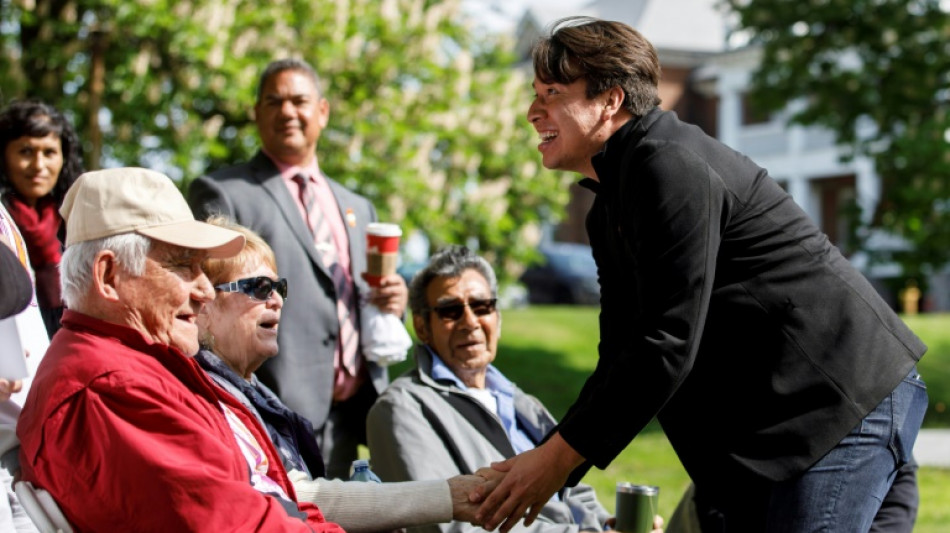
RBGPF
0.1600


For a century, tens of thousands of Indigenous, Inuit and Metis children in Canada were forcibly enrolled in state boarding schools, isolated from their families, language and culture as part of a failed policy of assimilation.
Canada has been grappling with the reality of this brutal past for some time, but the discovery last year of children's remains buried in hundreds of unmarked graves at one former school catapulted it back into the national consciousness, prompting shock and soul-searching.
Here's a timeline of those events:
- Government apology, 2008 -
Canadian Prime Minister Stephen Harper officially apologizes in June 2008 to Indigenous peoples for "failing them so profoundly."
"We are sorry," he says in the House of Commons, flanked by residential school alumni, adding that "the treatment of children in Indian Residential Schools is a sad chapter in our history."
- Truth and reconciliation, 2015 -
A truth and reconciliation commission, after spending six years interviewing more than 6,500 former students and others, creates a historical record of the residential school experience, concluding in 2015 that it amounted to "cultural genocide."
Many of the children were physically and sexually abused by teachers and headmasters, say commissioners who determined that at least 4,100 children died of disease, malnutrition or neglect. They estimate the actual toll to be much higher.
The commission also blames the schools policy for a high incidence of poverty, alcoholism and domestic violence, as well as high suicide rates in Indigenous communities.
- Unmarked graves found, May 2021 -
Tk'emlups te Secwepemc chief Rosanne Casimir announces in May 2021 the discovery, using ground-penetrating radar, of 215 unmarked graves at the former Kamloops Indian Residential School in British Columbia province.
Prime Minister Justin Trudeau orders Canadian flags atop federal buildings to be lowered to half-mast -- saying they would stay that way until Indigenous communities say it is ok to raise them again
They remain lowered for nearly six months.
In June, the Cowessess First Nation in Saskatchewan announces that as many as 751 unmarked graves have been discovered near the former Marieval Indian Residential School.
The Lower Kootenay Band also says it found 182 unmarked graves at the St. Eugene's Mission School in British Columbia.
Over the coming months, several more searches begin, eventually bringing the total number of unmarked graves found to more than 1,300.
- No celebrating Canada, July 2021 -
Victoria and other cities cancel Canada Day celebrations on July 1, 2021 to allow for "thoughtful reflections" on the nation's colonial past.
Police, meanwhile, report a wave of vandalism of churches and statues of monarchs splashed with red paint and torn down.
Mary Simon is named Canada's first Indigenous governor general.
- Truth and reconciliation day, September 2021 -
Canada marks its first National Day for Truth and Reconciliation on September 30, 2021.
"The tragic locating of unmarked graves at former residential school sites across the country has reminded us of not only the impacts of colonialism and the harsh realities of our collective past, but also the work that is paramount to advancing reconciliation in Canada," Trudeau says.
- Papal apology, April 2022 -
Pope Francis issues an apology on April 1, 2022 for abuses at church-run schools and the harms caused to generations of Indigenous peoples.
The Vatican also announces that the pontiff will travel to Canada to offer his apology in person on lands sacred to Indigenous peoples.
- Prince Charles acknowledges suffering, May 2022 -
Prince Charles acknowledges the suffering of Canada's Indigenous peoples, speaking during an official visit to Canada on behalf of the queen in May 2022.
"We must find new ways to come to terms with the darker and more difficult aspects of the past. Acknowledging, reconciling and striving do to better, it is a process that starts with listening," he says.
- Papal visit, July 2022-
Pope Francis, despite cancelling numerous events in recent months due to pain in his knee that has forced him to use a wheelchair, is scheduled at the end of July to visit Edmonton, Iqaluit and Quebec City.
There he will meet with Indigenous survivors of abuse committed at residential schools.
Y.Kimura--JT